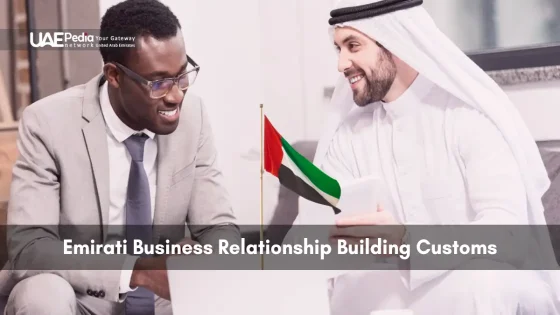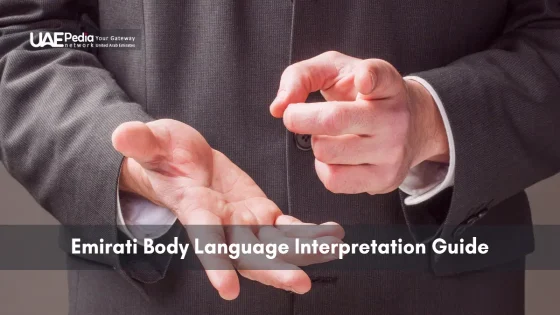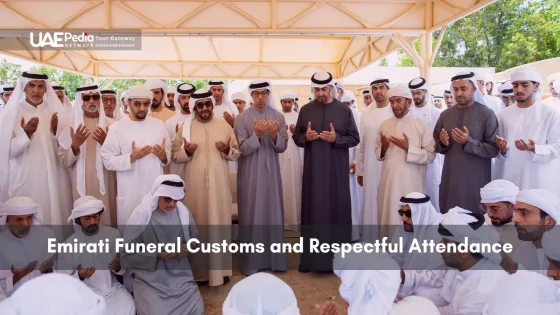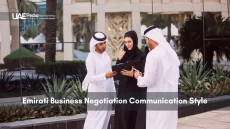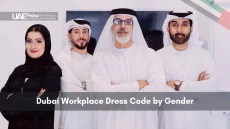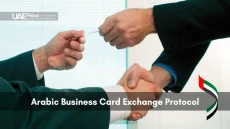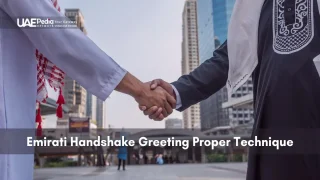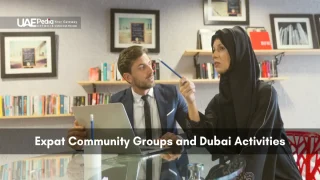The United Arab Emirates combines Islamic traditions with global commerce, requiring international professionals to master both modern business practices and cultural customs. This guide provides verified current information on UAE business etiquette, legal frameworks, and professional protocols as of November 2025. The UAE’s 10 million population includes approximately 88-90% expatriates, creating a multicultural environment where understanding local customs determines business success. Key updates include the 2022 working week change, 2023 corporate tax implementation, and evolving cultural practices.
UAE operates under mixed legal system with 9% corporate tax and Monday-Friday federal working week (changed January 2022). International professionals must master cultural protocols, dress codes, greeting customs, and digital regulations. Success requires understanding the 88-90% expatriate population and Ramadan practices (February-March 2026).
- Federal government: Monday-Friday 4.5-day week since 2022
- Corporate tax: 9% on income above AED 375,000
- Private sector: Many maintain Sunday-Thursday schedules
- Expatriates: 88-90% UAE-wide, 92% in Dubai
- Greetings: Address senior person first, right hand only
- Meetings: Face-to-face strongly preferred over email
- Photography: Prohibited without permission under cybercrime law
- Free zones: 0% tax with substance requirements
Essential Guide UAE Legal Framework and Business Operations
The UAE operates under a mixed legal system where federal civil and commercial law governs business transactions, while Islamic principles apply primarily to personal status matters for Muslims. Federal Decree-Law No. 47 of 2022 introduced 9% corporate tax on taxable income exceeding AED 375,000, effective June 1, 2023.
Working Week Structure Across Different Sectors
The UAE changed its federal government working week in January 2022. Current schedules vary significantly:
- Federal government: Monday through Friday with 4.5-day week (Friday ends at 12:00 PM).
- Private sector: Many companies continue Sunday through Thursday, others adopted Monday-Friday.
- Free zones: Each zone sets independent schedules.
- Standard private hours: 9:00 AM to 6:00 PM.
Ramadan 2026 (expected February 17-March 18) requires two-hour working hour reduction for Muslim employees. Non-Muslims should avoid eating, drinking, or smoking publicly during daylight hours to show cultural respect.
Read More:
Language and Professional Communication Requirements
Arabic serves as the official language for government documents and legal contracts. English functions as the primary commerce language for meetings and negotiations. Bilingual business cards with accurate Arabic translations demonstrate professionalism.
Professional Dress Code Standards
Business attire Dress Code must remain conservative. Requirements include:
- Men: Formal suits with ties in darker colors, long-sleeved shirts required.
- Women: Professional suits with skirts below the knee, shoulders and upper arms covered.
- All Professionals: Avoid casual wear, headscarves not required for non-Muslim women in business.
Greeting Protocols and Social Interaction Rules
Proper greeting etiquette follows strict hierarchy:
| Greeting Type | Protocol | Key Point |
|---|---|---|
| Male to Male | Right-hand handshake, may place left hand over heart | Handshakes are often longer than Western norms |
| Male to Female | Wait for the woman to extend her hand first | Do not initiate physical contact |
| Female to Female | Handshake or cheek kiss | Follow the other person’s lead |
| Verbal Greeting | “As-salamu alaikum” (peace be upon you) | Response: “Wa alaikum as-salam” |
Always greet the most senior person first, then others in descending order. Use appropriate titles including Sheikh, Sayed, or Sayeda.
UAE Business Etiquette: Building Trust and Personal Relationships
UAE business culture prioritizes personal relationships before commercial discussionsd necessary trust:
- Initial meetings focus on general conversation about family and background.
- Avoid rushing toward agreements or contracts.
- Accept hospitality including meals and refreshments.
- Participate in exhibitions and networking events.
- Secure introductions through mutual contacts when possible.
Meeting Expectations and Communication Practices
Schedule appointments no more than two weeks ahead and confirm one to two days before. Face-to-face meetings are strongly preferred over emails. Meetings may appear less structured with interruptions common, yet remain professional and patient throughout. Punctuality is expected from international visitors, though local counterparts may adopt flexible timing..
Negotiation and Decision Making
Trust-building precedes effective negotiations. Decision-making follows hierarchical structures with senior leadership deciding after consultations. Verbal agreements carry significant weight but require comprehensive written contracts. Engage qualified legal counsel familiar with UAE commercial law.
Digital Communication and Social Media Regulations
Federal Decree-Law No. 34 of 2021 governs cybercrime with penalties from AED 2,000 to AED 100,000. Photography of people without permission, government buildings, and military installations is prohibited. Online criticism of UAE government or Islam can result in legal consequences.
Check out the below:
Free Zones and Business Structure Options
Over 40 free zones offer 100% foreign ownership and duty exemptions. Mainland companies access full UAE markets but face 9% corporate tax above AED 375,000. Engage local partners for cultural expertise and government navigation.
Start with a warm handshake using your right hand, and say "As-salam alaykum" (peace be upon you). Wait for Emirati women to initiate handshakes—some may prefer a nod. Use formal titles like "Sheikh" or "Dr." until invited to use first names.
Avoid tight fits, sheer fabrics, or exposed shoulders/knees. Men should opt for tailored suits in neutral tones. Women often wear modest dresses or pantsuits with sleeves. In Sharjah and more conservative areas, looser silhouettes are preferred.
While traditional hierarchies exist, female leaders now drive major sectors like tech and finance. Dress conservatively, emphasize qualifications early, and expect direct engagement—Emirati executives value competence regardless of gender.
A> Meetings shorten to 4-5 hours, often starting post-Iftar. Avoid eating/drinking publicly during fasting hours. Gifting dates or Arabic sweets shows cultural awareness. Patience is key—decisions may pause until after Eid.
Trust is built through personal connections here. Share light stories about hobbies or local culture—but avoid intrusive questions. This "majlis mindset" creates comfort before diving into deals.
Mild negotiation shows engagement, but aggressive tactics backfire. Phrases like "Let’s find mutual benefit" work better than ultimatums. Government contracts have less flexibility than private sector agreements.
Align initiatives with national priorities like sustainability (UAE Net Zero 2050) or youth empowerment. Partner with local NGOs—check the Year of Giving guidelines. Even SMEs should report ESG efforts annually.
Decisions flow top-down, especially in family-owned firms. Always address the senior-most person first. If a manager says "We’ll study this," it often means seeking higher approval—not rejection.
Fridays are for prayers and family until ~4 PM. For critical talks, propose Sunday to Thursday mornings (common workweek). Social dinners on weekends build rapport but avoid alcohol unless host initiates.
Using first names without permission. Start with "Esteemed Mr. Al-Mansoori" and formal English. Never follow up during prayer times. And always CC local partners—transparency prevents misunderstandings.

